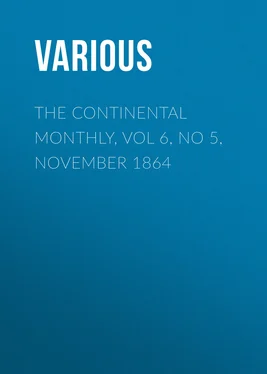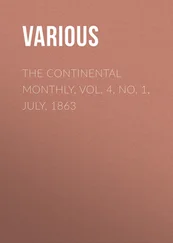Various - The Continental Monthly, Vol 6, No 5, November 1864
Здесь есть возможность читать онлайн «Various - The Continental Monthly, Vol 6, No 5, November 1864» — ознакомительный отрывок электронной книги совершенно бесплатно, а после прочтения отрывка купить полную версию. В некоторых случаях можно слушать аудио, скачать через торрент в формате fb2 и присутствует краткое содержание. Жанр: foreign_antique, periodic, Языкознание, Политика, foreign_edu, на английском языке. Описание произведения, (предисловие) а так же отзывы посетителей доступны на портале библиотеки ЛибКат.
- Название:The Continental Monthly, Vol 6, No 5, November 1864
- Автор:
- Жанр:
- Год:неизвестен
- ISBN:нет данных
- Рейтинг книги:4 / 5. Голосов: 1
-
Избранное:Добавить в избранное
- Отзывы:
-
Ваша оценка:
- 80
- 1
- 2
- 3
- 4
- 5
The Continental Monthly, Vol 6, No 5, November 1864: краткое содержание, описание и аннотация
Предлагаем к чтению аннотацию, описание, краткое содержание или предисловие (зависит от того, что написал сам автор книги «The Continental Monthly, Vol 6, No 5, November 1864»). Если вы не нашли необходимую информацию о книге — напишите в комментариях, мы постараемся отыскать её.
The Continental Monthly, Vol 6, No 5, November 1864 — читать онлайн ознакомительный отрывок
Ниже представлен текст книги, разбитый по страницам. Система сохранения места последней прочитанной страницы, позволяет с удобством читать онлайн бесплатно книгу «The Continental Monthly, Vol 6, No 5, November 1864», без необходимости каждый раз заново искать на чём Вы остановились. Поставьте закладку, и сможете в любой момент перейти на страницу, на которой закончили чтение.
Интервал:
Закладка:
Then contemplate the vast expansion of manufacturing industry, of which nine tenths belong to the Free States. In ten years from 1850 to 1860, this branch of labor had increased eighty-six per cent. , reaching the enormous sum of $2,000,000,000; $60 for every inhabitant of the Union. A million and a half of people were engaged as operatives therein, supporting nearly five millions—one sixth the whole population of the Union; while fully one third our population may be said to directly and indirectly live by manufactures.
The increase of iron manufactures in ten years was forty-four per cent.; the coal mines reached a treble yield in ten years; $10,000,000, of clothing were produced in 1860. The lumber trade had increased sixty-four percent, in ten years, reaching $100,000,000. Flouring mills showed sixty-five per cent, increase, reaching $225,000,000; spirits, $24,000,000; cotton manufactures had increased seventy-six per cent, in ten years, reaching $115,000,000; woollens had increased sixty-seven per cent.; boots and shoes walked up to $76,000,000, and leather to $63,000,000. The fishermen of New England increased mightily. The gold of California, copper of the Northwest, the salt of New York and Michigan had reached colossal proportions. Whoever studies the manufacturing statistics of the North for the past ten years will be at no loss to know why the manufacturers of Great Britain are willing to sever the Slave States from the Union, to gain a customer it was thus supplying in 1860.
Now add to this array of agriculture, manufactures, extent of territory, and excess of population, the superiority of the Free States in commerce. The tonnage of the Union was twenty-six millions in 1860, the fourth of which was the growth of the ten years previous. Out of the one thousand and seventy-one ships built in 1860, the 'nation' of South Carolina produced one steamer and one schooner! Contemplate the money power of the city of New York, the vast capital invested in trade, in banks, insurance, and the like, in the North. The slave aristocracy was becoming imprisoned in a vast web of financial dependence—a web that war and wholesale repudiation of debts alone could break through.
In 1860 there were in the Union 30,– 600 miles of railroad, costing $1,134,– 452,909, four times the extent of 1850. In 1850 only one line of railroad connected the Atlantic with the Mississippi. Now, of the eight great railroad and canal routes connecting the sea coast with this valley, six run through the Free States; transportation on these avenues costs but one tenth the old methods. Governor Letcher declares the Baltimore and Ohio Railroad has 'abolitionized' Northern and Western Virginia, and the Southern rebellion has been especially savage on railroads. Whoever would understand one secret of the consolidation of the people should study the railroad map of the Northern States, and contrast it with the South. It was a fine tribute to the value of the railroad that the first use the people made of their new political supremacy in 1860 was to pass the bill for connecting the Atlantic and Pacific by the iron rail and the telegraphic wire.
This vast advancement in free labor, from 1820 to 1850, was fitly closed in 1850 by the annexation of California to the roll of the Free States, securing to liberty the gold mines and the Pacific coast. It is impossible to comprehend all the consequences of this step. It was the decisive industrial triumph of the people over the slave aristocracy. The Slave Power went mad over the defeat, and for the last ten years has virtually abandoned the rivalry of industries, and turned to violence , breaking of compromises, forcible seizure of the ballot box, repudiation of debts, stealing of arms, and finally cruel war, as if lying and robbing, in the long run, could upset free and honest industry. After the loss of California and the Pacific coast, the struggle for the Territories was but a, preliminary skirmish of the war for the conquest and desolation of the Union. The people had waged the battle of liberty with the gigantic agencies of material prosperity for forty years, and the aristocracy was completely in their power .
For this material superiority of the free-labor States inevitably inured to the advantage of liberty. In vain did every new Free State, year after year, vote with the Slave Power; in vain did every great railroad and manufacturing corporation of the North obey the political behests of the lords of the plantations; in vain was the mercantile aristocracy of all the great cities the fast friend of the slave aristocracy; and vainly did almost the entire immigrant population fall politically into its control. All this was as nothing against the irresistible natural tendency of free labor . The Irishman who voted against the negro was breaking his chain with every blow of his pick. The Wall-street banker, the great railroad king, the cotton manufacturer, who railed against abolitionism like mad, were condemning the slave aristocracy every day they lived. There is a divine law by which the work of freemen shall root out the work of slaves; and no law enacted by the will of Northern doughfaces could repeal this statute of nature. These Northern friends of the aristocracy supposed themselves to be helping their ambitious allies by their political support. But the slaveholders knew how fallacious was this aid. They saw that the North was gaining a huge superiority to the South; that the people were slowly consolidating; that when the free-labour interest did finally concentrate, it would carry every Northern interest with it, and, when the pinch came, no Northern party or statesman could or would help them do their will. They carefully sifted all offers of aid from such quarters, and having used every Northern interest and institution and party till it was squeezed dry of all its black blood, they turned their backs haughtily on the white sections of the Union, plundered friend and foe alike, and flew into civil war, out of spite and rage at the census of 1860; in other words, declared war against the providence of God as manifested in the progress of free society . They have fought well; at first, perhaps, better than we; but when General Lee 'flanks' the industrial decrees of the Almighty, and Stuart 'cuts the communications' between free labor and imperial power, they will destroy this republic—and not till then.
But was this great material gain of the people to be accompanied by a corresponding spiritual advancement? Was man to become the chief object of reverence in this wonderfully expanding industrial empire? If not, all this progress was deceptive, and nobody could predict how soon our very superiority should be turned to the advantage of that aristocracy which had perverted so many things in the republic.
It could not be denied that the Free States were making wonderful strides, during these forty years, in mental cultivation and power. The free industry of the North was an education to the people, and nowhere has so much popular intelligence been carried into the business of life as here. This period also witnessed the organization of the free school everywhere outside of New England, its home; the daily press, the public lecture, the creation of an American literature, all Northern; the growth of all institutions of learning and means of intellectual and artistic cultivation unparalleled in any other age or land. No well-informed person could also deny the astonishing progress in furnishing the means of religious instruction, the multiplication of churches, great ecclesiastical organizations, and philanthropic leagues. Notwithstanding the apparent absorption of the North in its material prosperity, no people ever was so busy in furnishing itself with the means of spiritual improvement; and though a population of several millions of ignorant and superstitious foreigners was thrown in upon it during these eventful years, it came out at the end the most intelligent people, the best provided with the apparatus of religion, that was ever known.
Читать дальшеИнтервал:
Закладка:
Похожие книги на «The Continental Monthly, Vol 6, No 5, November 1864»
Представляем Вашему вниманию похожие книги на «The Continental Monthly, Vol 6, No 5, November 1864» списком для выбора. Мы отобрали схожую по названию и смыслу литературу в надежде предоставить читателям больше вариантов отыскать новые, интересные, ещё непрочитанные произведения.
Обсуждение, отзывы о книге «The Continental Monthly, Vol 6, No 5, November 1864» и просто собственные мнения читателей. Оставьте ваши комментарии, напишите, что Вы думаете о произведении, его смысле или главных героях. Укажите что конкретно понравилось, а что нет, и почему Вы так считаете.












